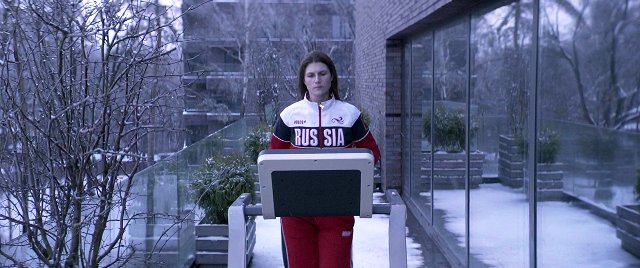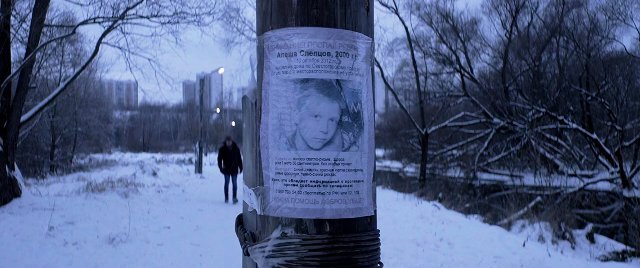LOVELESS
****
Director: Andrey Zvyagintsev
Screenwriters: Andrey Zvyagintsev and Oleg Negin
Principal cast:
Maryana Spivak
Aleksey Rozin
Matvey Novikov
Marina Vasileva
Andris Keyshs
Alexey Fateev
Country: Russia/France/Germany/Belgium/USA
Classification: MA15+
Runtime: 127 mins.
Australian release date: 25 April 2018
Previewed at: Palace Central, Sydney, on 11 April 2018.
Loveless is Andrey Zvyagintsev’s brilliant observation of Russian life, current day society and post-modern anguish, and it follows in the footsteps of his earlier successes The Return, Elena, and Leviathan, all of which were well received in Australia. Like those films, Loveless has also received a swathe of awards, including the 2017 Jury Prize at Cannes, and it was Russia’s entry for Best Foreign Language Film at the recent Academy Awards.
The still, non-judgemental lens of long-term Zvyagintsev collaborator Mikhail Krichman’s camera once again envelops us in a bleak environment which is both visually and emotionally draining. It’s Moscow and we watch as a 12-year-old boy, Alyosha (Matvey Novikov), emerges from his school classroom to take a circuitous route home by a river where he plays with some old crime scene tape, a scene that sets up the unnerving feeling that something is amiss. He’s obviously in no hurry to get home. His parents have recently separated but his dad still occasionally sleeps on the sofa in their flat, which they’re trying to sell. His mother Zhenya (Maryana Spivak) has taken a new lover, Anton (Andris Keiss), who is wealthier than her husband Boris (Aleksey Rozin). Boris, too, is in the process of shacking up with a new partner Masha (Marina Vasilyeva), who’s pregnant with their child. Both parents are totally immersed in their new lives and eager to move on. Zvyagintsev comments, “Our post-modern era is a post-industrial society inundated by a constant flow of information received by individuals with very little interest in other people as anything else than a means to an end. These days, it’s every man for himself.” Consequently, Alyosha feels alone and unwanted, for his parents appear to have already moved on and he is in no doubt that he’s viewed as a drag on their new futures. There’s a particularly heart-breaking scene when we see the boy’s face after he overhears mum and dad talking about what to do with him. And then he disappears. Boris and Zhenya are suddenly forced to confront the consequences of their actions but are up against a jaded police system that is both ambivalent about the boy’s absence and lacking in the resources to search for him, so they have to engage a group of volunteer searchers led by Ivan (Alexey Fateev). He urges them to visit Zhenya’s grandmother in the country, a visit that chillingly exposes the heart of the family’s malaise, for she is as bitter as the wind that sears the steppes and has nothing decent to say about herself, her daughter or, indeed, life itself.
The tough script of Loveless, co-written by Zvyagintsev and Oleg Negin, is brilliantly brought to life by an exceptionally fine cast: young Novikov is extraordinary and he’s closely matched by Spivak and Rozin. This is a stylish piece of film-making and it’s unrelenting in its grim portrayal of a society that seems to be hovering on the brink of collapse, or perhaps more precisely, a society that, in its obsession with self-gratification, has forgotten the basic principles of decency and compassion. You can easily extrapolate from this, however, and understand that it’s not just Russia that’s represented in this extremely uncomfortable and yet utterly compelling work. There is hope, though, at least according to the director, who opines that, “The only way out of this indifference is to devote oneself to others, even perfect strangers - like the volunteer search coordinator who combs the town looking for this vanished child, with no promise of reward, as if it was his life’s true purpose. This basic task imbues his every action with meaning. It is the only means of fighting dehumanization and the world’s disarray.”
Screenwriters: Andrey Zvyagintsev and Oleg Negin
Principal cast:
Maryana Spivak
Aleksey Rozin
Matvey Novikov
Marina Vasileva
Andris Keyshs
Alexey Fateev
Country: Russia/France/Germany/Belgium/USA
Classification: MA15+
Runtime: 127 mins.
Australian release date: 25 April 2018
Previewed at: Palace Central, Sydney, on 11 April 2018.
Loveless is Andrey Zvyagintsev’s brilliant observation of Russian life, current day society and post-modern anguish, and it follows in the footsteps of his earlier successes The Return, Elena, and Leviathan, all of which were well received in Australia. Like those films, Loveless has also received a swathe of awards, including the 2017 Jury Prize at Cannes, and it was Russia’s entry for Best Foreign Language Film at the recent Academy Awards.
The still, non-judgemental lens of long-term Zvyagintsev collaborator Mikhail Krichman’s camera once again envelops us in a bleak environment which is both visually and emotionally draining. It’s Moscow and we watch as a 12-year-old boy, Alyosha (Matvey Novikov), emerges from his school classroom to take a circuitous route home by a river where he plays with some old crime scene tape, a scene that sets up the unnerving feeling that something is amiss. He’s obviously in no hurry to get home. His parents have recently separated but his dad still occasionally sleeps on the sofa in their flat, which they’re trying to sell. His mother Zhenya (Maryana Spivak) has taken a new lover, Anton (Andris Keiss), who is wealthier than her husband Boris (Aleksey Rozin). Boris, too, is in the process of shacking up with a new partner Masha (Marina Vasilyeva), who’s pregnant with their child. Both parents are totally immersed in their new lives and eager to move on. Zvyagintsev comments, “Our post-modern era is a post-industrial society inundated by a constant flow of information received by individuals with very little interest in other people as anything else than a means to an end. These days, it’s every man for himself.” Consequently, Alyosha feels alone and unwanted, for his parents appear to have already moved on and he is in no doubt that he’s viewed as a drag on their new futures. There’s a particularly heart-breaking scene when we see the boy’s face after he overhears mum and dad talking about what to do with him. And then he disappears. Boris and Zhenya are suddenly forced to confront the consequences of their actions but are up against a jaded police system that is both ambivalent about the boy’s absence and lacking in the resources to search for him, so they have to engage a group of volunteer searchers led by Ivan (Alexey Fateev). He urges them to visit Zhenya’s grandmother in the country, a visit that chillingly exposes the heart of the family’s malaise, for she is as bitter as the wind that sears the steppes and has nothing decent to say about herself, her daughter or, indeed, life itself.
The tough script of Loveless, co-written by Zvyagintsev and Oleg Negin, is brilliantly brought to life by an exceptionally fine cast: young Novikov is extraordinary and he’s closely matched by Spivak and Rozin. This is a stylish piece of film-making and it’s unrelenting in its grim portrayal of a society that seems to be hovering on the brink of collapse, or perhaps more precisely, a society that, in its obsession with self-gratification, has forgotten the basic principles of decency and compassion. You can easily extrapolate from this, however, and understand that it’s not just Russia that’s represented in this extremely uncomfortable and yet utterly compelling work. There is hope, though, at least according to the director, who opines that, “The only way out of this indifference is to devote oneself to others, even perfect strangers - like the volunteer search coordinator who combs the town looking for this vanished child, with no promise of reward, as if it was his life’s true purpose. This basic task imbues his every action with meaning. It is the only means of fighting dehumanization and the world’s disarray.”

